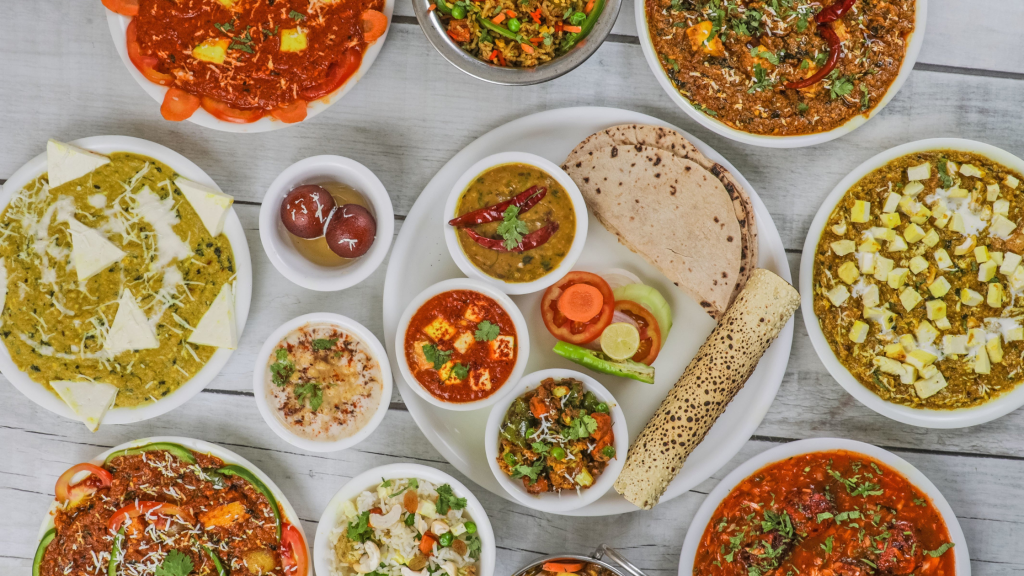India is a country famous for its diverse culture and tradition. It has a rich culinary heritage with a vast variety of traditional and regional cuisines. Indian food is nutritious and provides benefits for health.
A typical Indian diet is well known for the spices. The spices like turmeric, ginger, cumin, cardamom etc. have medicinal properties. Traditional Indian diet contain a range a vegetables, fresh herbs, dairy products and cereals which are good for health. The diet includes a variety of pulses and grains that contributes to health.
Indian foods are not only tasty but also have a lot of health benefits. Here are the list of top healthy Indian food and their health benefits.
Indian food and health benefits
1. Pulses
Pulses are the essential part of Indian diet. They are rich in protein, anti-oxidants, vitamin and minerals. Variety of pulses are used in Indian diet. Lentils, dal, beans, green gram, peas, chickpeas etc. are some of the most commonly used pulses in Indian diet. They are easy to cook and has enormous health benefits.
2. Millets
Millets are traditionally grown food grain that are a part of Indian diet since ancient times. They are nutritious healthy food with plenty of proteins, fibres and anti-oxidants. Variety of healthy millet recipes are available in Indian diet. Intake of millets helps in weight loss, strengthen your body and improves immunity. Ragi, Jowar, Bajra and Little millet are some of the millets common in Indian diet.
3. Fresh herbs and vegetables
Indian regional cuisine uses a variety of seasonal vegetables in cooking. The herbs and vegetables used in Indian cooking has extreme health benefits. Spinach, Coriander leaves, Drumstick leaves or moringa, Cabbage, Mint leaves, Curry leaves, bay leaves, fenugreek leaves and Bamboo shoot are some of the leaves used in Indian diet. A wide variety of vegetables are used in different combinations in Indian cooking. Tomato, carrot, potato, lady’s finger (okra), cauliflower, drumstick, snake gourd, bell pepper (Capsicum) etc. are few of them.
4. Dairy Products
Diary food products such as milk, yoghurt, cheese, paneer etc are part of Indian diet. Diary food are rich in calcium and protein. They are nutritious and contain vitamins like vitamin A, vitamin D and vitamin B12.
5. Spices
Spices are the integral part of Indian food. It not only enhances the taste but also provides aroma to food. They have medicinal values and provides health benefits. They have anti-oxidant, anti -inflammatory and anti – bacterial properties. Turmeric, cumin, fenugreek, ginger, garlic, asafoetida etc. are the spices that are commonly used in Indian food.
6. Fruits
Fruits are important in a healthy diet. They are a good source of fibre, vitamins and minerals. A wide variety of exotic and rare fruits are grown in India. According to the Agricultural and Processed Food Products Export Development Authority of India, APEDA, India is the largest producer of Fruits in the world and is known as the fruit basket of the world. The major fruits grown in India are Mangos, Grapes, Apples, Apricots, Oranges, Fresh Banana, Avocados, Guava, Litchi, Papaya, Sapota and Water Melons.
Healthy Indian Dishes
Indian dishes are delicious and provides a lot of benefits to health. There are a wide variety of Indian dishes and diverse food choices that depends on the region, culture and climate. Some of the healthy Indian dishes include:
1. Roti
Roti is flat bread made from whole – wheat flour. Roti is a good source of soluble fibre that helps in digestion. It helps to lower the blood cholesterol level.
2. Dal
Dal, the lentil is common in Indian kitchen. They are rich in proteins and contains dietary fiber. Urad dal, moong dal, masoor dal, toor dal, channa dal etc. are some of the commonly used dal in Indian diet. Most dal recipes are simple to cook. Common dal recipes include dal fry, dal tadka, dal makhana, and dal soup.
3. Steamed or boiled Rice
Rice contains plenty of carbohydrates that gives energy to the body. It is a nutritious cereal that is common in Indian diet. Brown rice has comparatively more heath benefits than white rice.
4. Poha
Poha is flattened rice that is commonly used in Indian cuisines. They are easily digestible and can be eaten without cooking. They are good source of carbohydrates and contain probiotics. They provide energy and is rich in iron, fibre, vitamins and minerals. Poha recipes are simpler and easy to prepare.
5. Rajma
Rajma or kidney beans are nutritious healthy food that are useful in weight management. They have soluble fibers and can regulate blood sugar. Kidney beans contain minerals, vitamins and carbohydrates. It can lower the cholesterol level, has anti-oxidant properties and can strengthen the bones.

